Key takeaways:
- Mindful eating fosters a deeper connection with food, enhances emotional well-being, and encourages healthier food choices.
- Identifying personal eating triggers and creating a supportive environment are essential steps in developing a mindful eating routine.
- Tracking progress and celebrating small successes reinforces motivation and allows for a more fulfilling relationship with food.
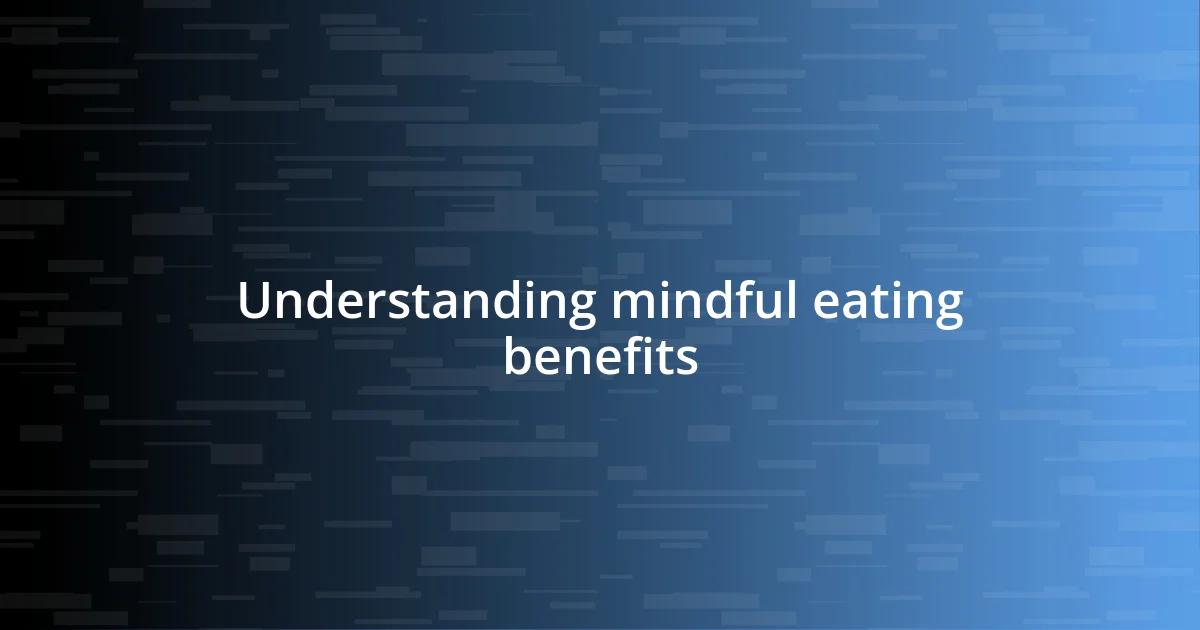
Understanding mindful eating benefits
One of the most profound benefits of mindful eating is the deeper connection it fosters with our food. I remember a time when I would scarf down meals without a second thought, barely tasting the flavors. When I shifted to mindfulness, each bite transformed into an experience; I started noticing the subtle spices and textures I had missed before. Isn’t it incredible to consider how we can reignite our senses and enjoyment of food simply by slowing down?
Mindful eating also plays a significant role in emotional well-being. I’ve noticed that when I eat mindfully, I often recognize emotions that I previously stuffed down with my food—stress, boredom, even happiness. This awareness has been crucial in helping me differentiate between hunger and emotional needs. Have you ever pondered how your mood affects your cravings? The answer lies in that moment of reflection before you indulge.
Additionally, mindful eating encourages healthier food choices. I distinctly recall a moment when, while practicing mindfulness, I chose a vibrant salad over comfort food because I genuinely craved nourishment rather than just filling my stomach. This shift not only improved my physical health but also enriched my emotional health, providing a sense of control and empowerment. Isn’t it liberating to realize that our food choices can reflect our growth mindset?
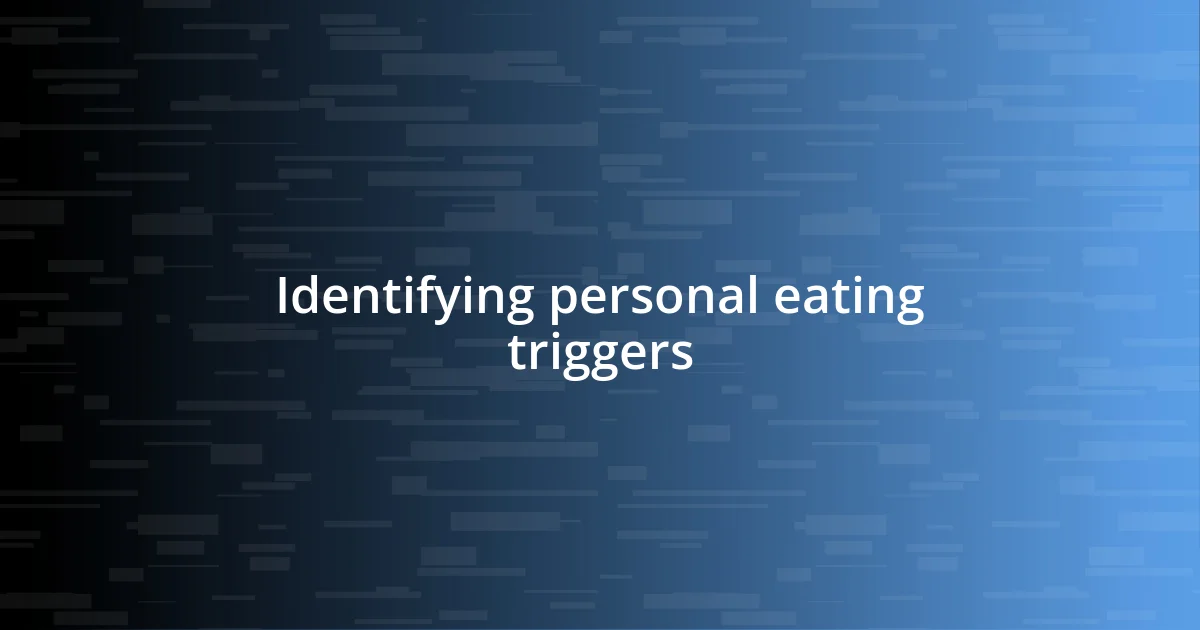
Identifying personal eating triggers
Identifying personal eating triggers involves a deep dive into our daily habits and emotional patterns. I remember that evenings were my most challenging times, often leading to mindless snacking in front of the TV. It wasn’t until I started to notice that as the sun set, my sweet cravings surged that I recognized this pattern. Keeping a food diary helped unveil these triggers, allowing me to confront them rather than succumb.
Another significant revelation came when I realized how stress influenced my eating habits. At work, during particularly stressful days, I found myself reaching for chips and sweets almost on autopilot. Reflecting on those moments helped me connect my emotional state with my eating choices. I began replacing snacks with healthier options or engaging in other relaxing activities like a short walk. Have you ever paused to consider what situations spark your cravings?
Understanding these personal triggers creates a powerful opportunity for change. It’s fascinating how this awareness has empowered me to respond to my body’s signals more effectively. Instead of allowing external cues to dictate my eating, I now take a step back and check in with myself. This journey towards mindful eating is about building a more fulfilling relationship with food.
| Trigger Type | Example |
|---|---|
| Emotional | Eating when stressed or anxious |
| Environmental | Snacking while watching TV |
| Situational | Celebrating with food during gatherings |
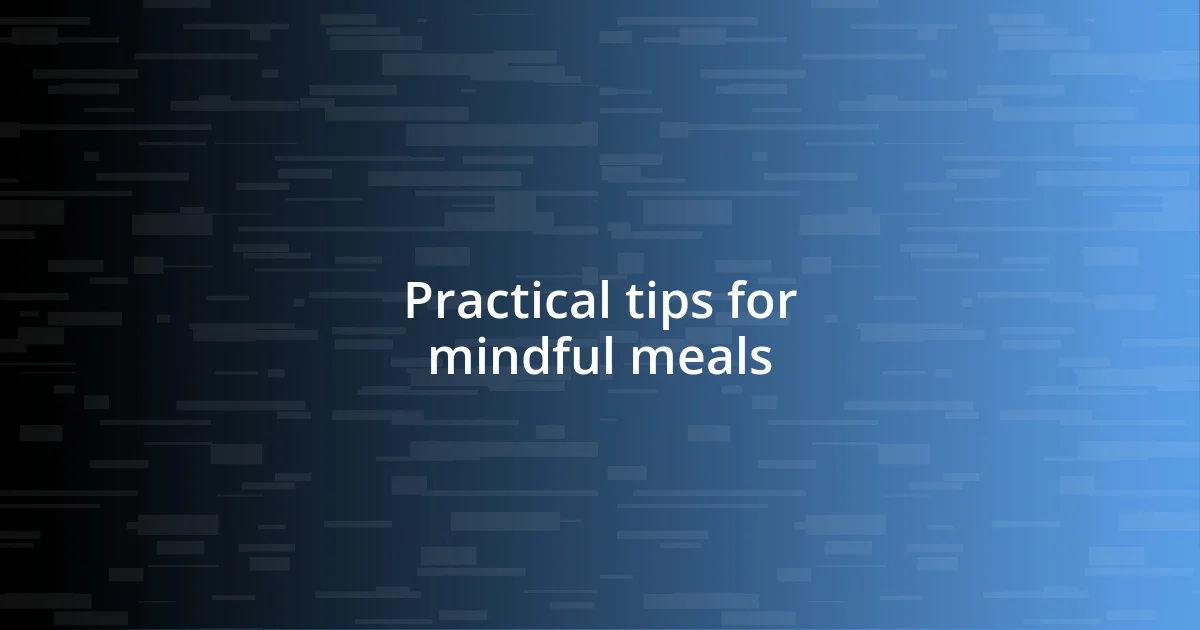
Practical tips for mindful meals
Embracing mindful meals starts with creating an environment that allows you to focus on your food. I recall a time when I turned off the TV and put my phone away during meals. This simple act transformed my dining experience. Suddenly, I was aware of every flavor and texture, enhancing my appreciation for each bite. I found that this distraction-free zone made it easier to listen to my body’s signals, allowing me to eat only until I was satisfied, not stuffed.
Here are some practical tips to cultivate mindfulness during meals:
- Set the Scene: Choose a calm, clean space for eating. Consider dimming the lights or playing soft music.
- Use Smaller Plates: This can help control portion sizes and makes your meal look more satisfying.
- Savor Each Bite: Take time to chew slowly and appreciate the flavors. This helps enhance your connection with food.
- Reflect Before Eating: Pause to consider your hunger and emotional state. Ask yourself, “Am I truly hungry or just bored?”
- Practice Gratitude: Before meals, take a moment to express gratitude for the food and the effort that went into preparing it.
Another key aspect of mindful eating is tuning in to your body’s hunger cues. I once realized I was eating breakfast out of habit, even when I wasn’t hungry. That epiphany led me to listen more closely to my body. Now, I check in with myself regularly, asking questions like, “Is my stomach growling, or am I just looking for something to do?” This process has made me more intentional about when and what I eat, leading to a more satisfying relationship with food. By aligning my meals with my body’s true needs, I feel more energized, emotionally balanced, and connected to the rhythms of my own body.
Implementing these strategies not only enhances my enjoyment of meals but also fosters a deeper understanding of my body’s nutritional needs.
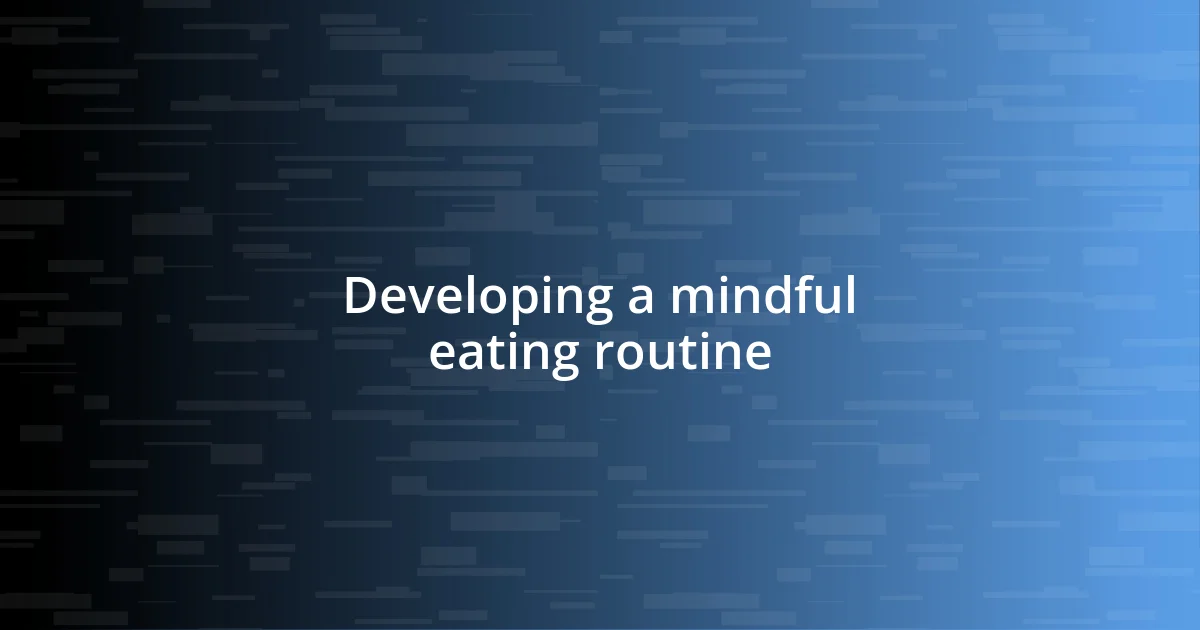
Developing a mindful eating routine
Developing a mindful eating routine requires consistent practice and reflection on one’s habits. I remember the early days when I struggled to embrace this new approach. My meals were often rushed, and I barely registered what I was eating. But once I committed to dedicating time for each meal, everything changed. I found myself genuinely appreciating each dish, savoring not just the taste but the entire experience.
Creating a calming atmosphere at mealtime has proven to be essential for me. I now enjoy lighting a candle or playing soft music, which instantly shifts my mindset. These small rituals remind me that mealtime is a moment for nourishment, not just a quick pit stop. Have you ever noticed how a serene environment can impact your eating experience? For me, it certainly makes a difference in how I interact with my food.
Lastly, I actively incorporate reflection into my eating routine. After each meal, I take a brief moment to assess how I feel—physically and emotionally. This practice has been illuminating. For instance, I once realized that I felt energized after a wholesome lunch but sluggish after a heavy one. This insight encourages me to make smarter choices and has transformed the way I approach food. I’ve learned to ask, “How do I want to feel after this meal?” This question guides my choices, reinforcing my journey toward mindful eating.
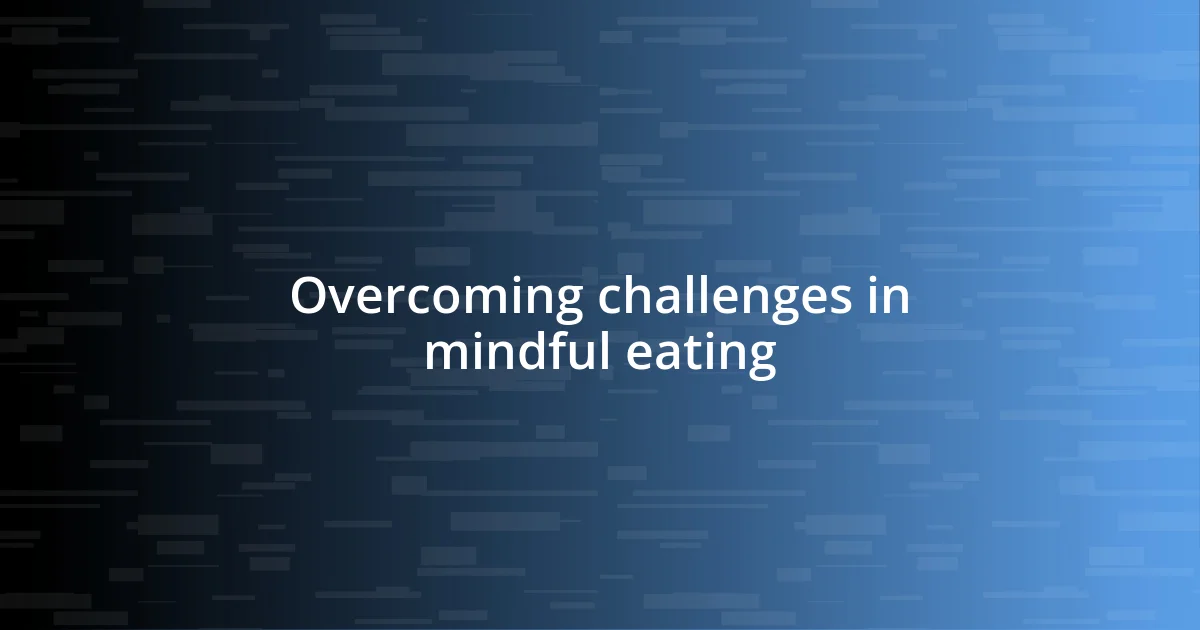
Overcoming challenges in mindful eating
Overcoming challenges in mindful eating can be a real journey, especially when our lives feel so fast-paced. I remember a challenging moment at a family gathering, where the food was plentiful, but so were the distractions. It took great effort to focus on my plate when conversations and laughter filled the room. In those moments, I began to acknowledge that it was okay to step away briefly to really relish my food in peace, even if it meant missing a few jokes.
There have been times when I found myself mindlessly snacking while watching a movie. It’s so easy to lose track of how much I’m eating when I’m engrossed in a storyline. By deciding to place my snacks in a bowl rather than the entire bag, I noticed a significant shift. Not only did it help control my portions, but I also became more aware of each bite. Isn’t it fascinating how a small change can lead to a much more fulfilling experience?
Staying committed to mindful eating means being gentle with myself during times of slip-ups. I recall a week when my schedule felt overwhelming, and I found myself reverting to old habits of eating on the go. Recognizing that this was just a phase allowed me to refocus without guilt. I simply paused, took a deep breath, and returned to my mindful practices. Each little setback was a lesson, reminding me that the path to embracing mindful eating is not always linear.
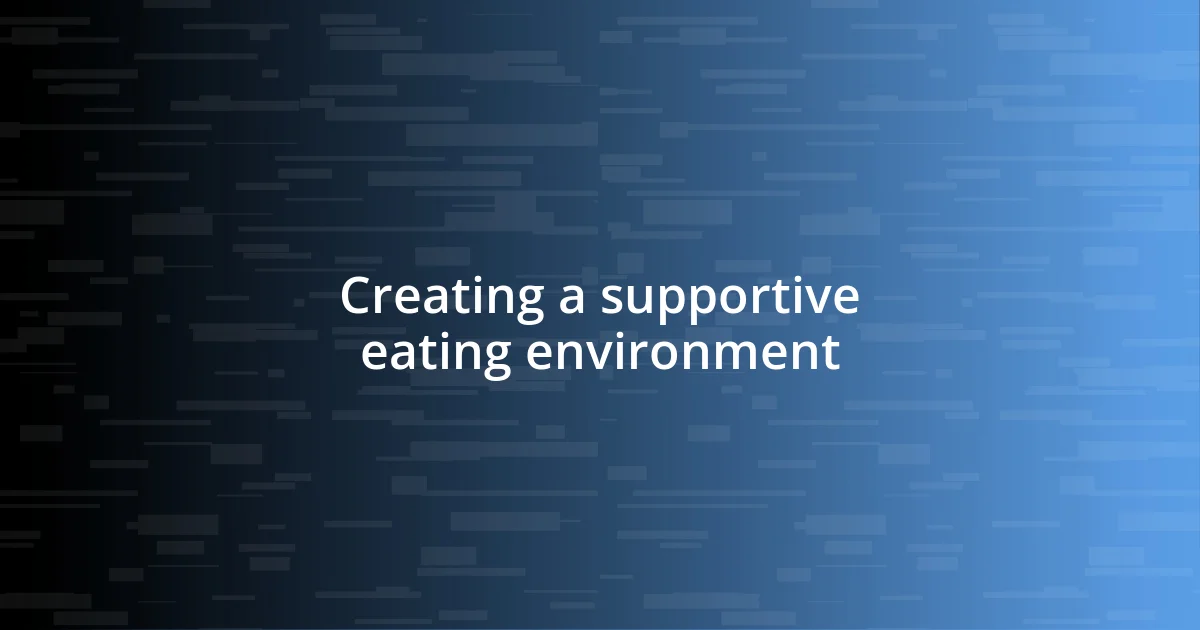
Creating a supportive eating environment
Creating a supportive eating environment can truly transform your relationship with food. I recall setting the dining table with care, taking a moment to choose my favorite dishes and arrange them thoughtfully. It may sound simple, but that act cultivated a sense of reverence for the meal ahead. Who knew that a well-set table could actually enhance my appreciation for each bite?
I also realized the power of shared meals. Inviting friends over for dinner became an integral part of my eating experience. The laughter, stories, and connection we shared over food turned each meal into a celebration, fostering a more mindful approach. Have you ever noticed how the atmosphere of eating together draws you deeper into your food? It made me aware of how our environment shapes our eating habits—rich, intimate conversations encouraged me to slow down and savor, rather than rush through my plate.
Moreover, the physical space where I eat plays a crucial role. I started decluttering my dining area, eliminating distractions like electronic devices and excessive decorations. By creating a minimalist and inviting setting, I found myself more focused and at ease during meals. This shift reminded me that the essence of mindful eating lies not just in the food itself but in the environment that cradles those moments. What do you think? Could a simple tweak in your dining space elevate your eating experience?

Tracking progress and celebrating success
Tracking progress in mindful eating has been an enlightening experience for me. I took to journaling my meals and feelings, discovering patterns I hadn’t noticed before. Each entry became a snapshot of my journey, allowing me to celebrate small victories, like choosing whole foods or savoring flavors. Isn’t it amazing how documenting our habits can shine a light on our growth?
Celebrating success feels just as important as tracking progress. One evening, after a week of truly mindful eating, I treated myself to a delightful homemade dessert. I was not only proud of my commitment but also thrilled to reward myself in a way that respected my hard work. How do you like to celebrate your milestones? In moments like these, I realized that honoring my journey enhances my motivation to maintain healthy habits.
Reflecting on my journey, I learned that success isn’t always about perfection. There are days when I triumph with each mindful bite, and others where I stumble. Embracing this complexity allows for a more profound sense of achievement. For me, celebrating the effort and intention behind each meal has turned success into a continual adventure. How do these reflections resonate with your own experiences in mindful eating?














